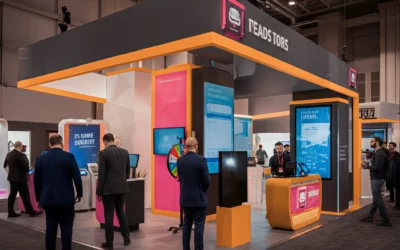In today’s competitive business landscape, conference planning has become an indispensable tool for companies looking to strengthen their brand, reach their target audience, and build lasting relationships. Whether it’s launching a new product, influencing key stakeholders, or establishing thought leadership, a well-executed conference can elevate a company’s reputation and open doors to new opportunities. However, while the benefits of hosting a successful conference are clear, the complexities involved in planning and execution are often underestimated.
Effective conference planning isn’t just about booking a venue and sending invitations. It requires strategic vision, careful coordination, and the ability to create an experience that resonates with attendees. Companies that understand the importance of this process recognize that professional help is essential to avoid the pitfalls of DIY event management.
Types of Conferences and Their Strategic Value
The type of conference you host depends on your business objectives. Here’s a breakdown of the most common types of conferences and what they can achieve:
1. User Conferences
User conferences bring together current customers to educate, engage, and deepen their connection with your product or service. These events are typically designed to increase customer loyalty, offer training opportunities, and gather feedback for future product development. A well-executed user conference not only strengthens relationships but can also drive upsell opportunities and create brand advocates.
2. Sales Conferences
Sales conferences are focused on energizing and aligning your sales force. These events usually feature motivational speakers, product training, and team-building activities. When done right, sales conferences can inspire your team to hit new sales targets and foster a collaborative environment that helps your business grow.
3. Partner Conferences
Partner conferences are aimed at deepening relationships with business partners, distributors, or affiliates. These events help build trust and ensure your partners are aligned with your company’s goals, product offerings, and market strategy. Partner conferences are crucial for reinforcing the value of your business relationships and maximizing their potential.
4. Industry Conferences
Industry conferences bring together thought leaders, innovators, and influencers from a specific field to discuss trends, challenges, and opportunities. Hosting or sponsoring such an event positions your company as an industry leader, fostering valuable networking and collaboration opportunities.
5. Product Launch Conferences
A product launch conference is an ideal way to introduce a new product to the market. It combines spectacle with education, offering your audience a first-hand experience of your new offering. A successful product launch conference can generate media buzz, excite your customers, and increase immediate sales.
6. Training Conferences
Training conferences are designed to enhance the skills and knowledge of attendees, often within a particular industry or niche. These events can include hands-on workshops, certification opportunities, and access to expert insights, making them highly valuable for professional development.
Each of these conference types serves a unique purpose and requires a tailored approach to planning and execution. This is where the expertise of an experienced event planning partner becomes invaluable.

The Complexity of Conference Planning: Why Professional Help Matters
It’s easy to underestimate the intricacies involved in conference planning. What may seem like a straightforward task is actually a multi-layered process requiring attention to detail, time management, and the ability to anticipate and solve problems before they arise.
Here are some key areas where professional expertise can make a significant difference:
1. Venue Selection and Management
Choosing the right venue is more than just about space—it’s about location, accessibility, and the amenities needed to enhance your event. A professional planner has the knowledge and industry connections to negotiate the best deals, find the right fit, and manage the logistics that come with venue coordination.
2. Budget Management
Every conference has a budget, but without careful planning, costs can quickly spiral out of control. Event planners are skilled in creating detailed budgets, identifying hidden costs, and making sure your event delivers value without overspending.
3. Technology Integration
In today’s world, the right technology can make or break your conference. From virtual conferencing tools and mobile event apps to audiovisual setups and live streaming, the tech requirements of a modern conference are complex. A seasoned event planner ensures all technology is seamlessly integrated and functional, providing a smooth experience for attendees.
4. Attendee Engagement
Ensuring that attendees are not just present but actively engaged is critical to a conference’s success. This involves creating interactive sessions, organizing networking opportunities, and utilizing tools like polls, Q&A sessions, and gamification to keep your audience interested.
5. Crisis Management
Even the best-planned events can face unexpected challenges—whether it’s a last-minute speaker cancellation or a technical glitch. An experienced event planner has the foresight and contingency plans in place to handle these issues without disrupting the flow of your event.
Why Choose J.Shay Event Solutions?
At J.Shay Event Solutions, we understand that your conference is more than just a gathering—it’s a reflection of your brand, your mission, and your company’s goals. Our team specializes in the strategic planning and flawless execution of corporate events, taking the burden off your shoulders so you can focus on what matters most—connecting with your audience.
With years of experience in handling everything from small training seminars to large-scale industry conferences, we know how to create unforgettable experiences. From venue selection and logistics to speaker coordination and attendee engagement, we take care of every detail to ensure your event runs smoothly.
Let us handle the complexities of conference planning while you reap the rewards of a successful event. Contact J.Shay Event Solutions today to start planning your next conference and make it an experience your attendees will never forget.
You might also like…
Top 10 U.S. Meeting Destinations for 2026
Successful corporate events don’t just happen — they’re built on smart decisions, starting with...
The Trade Show Prep Guide: Boost ROI Like a Pro
Trade shows are a powerful way to elevate your brand's visibility, connect with potential...
President’s Club 2026 Ultimate Gift Guide
Luxury, Personalization, and Impact for Unforgettable Incentive Travel President’s Club isn’t just...




